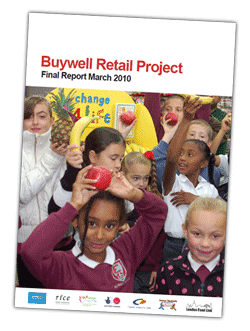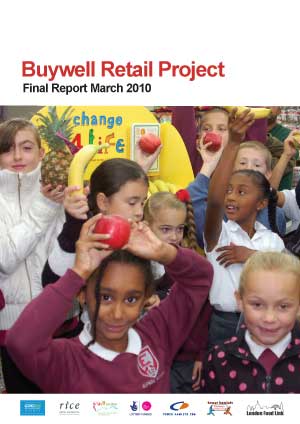 Many deprived communities suffer from poor availability of fresh, affordable fruit and vegetables, which can lead to an unhealthy diet and thereby widen health inequalities.
Many deprived communities suffer from poor availability of fresh, affordable fruit and vegetables, which can lead to an unhealthy diet and thereby widen health inequalities.
Local convenience stores are located at the heart of these communities and form an integral part of the local economy. Often these family owned businesses have been established over many years, and sales typically comprise confectionery, newspaper and tobacco products, with limited sales of fresh foods.
There is a misperception in the convenience sector about the profitability of fresh produce versus other products, because retailers attempting to stock fresh fruit and vegetables often experience poor sales and high wastage. However, this is largely due to poor quality produce, high prices and a lack of understanding on how the category needs to be managed and displayed. Fruit and vegetables can be a highly profitable category so working with businesses to grow their sales of fresh produce can provide a long lasting and profitable way to tackle the poor provision of healthy food that many low income Londoners experience.
The Buywell Retail project, funded by the Big Lottery, aimed to support local convenience stores, in particular, to improve access to fresh, affordable and sustainable fruit and vegetables in Well London areas and other low-income areas of London. The project was run from March 2009 until March 2010. This report outlines what we did, what happened as a result, and what we learned from the pilot project. As a result:
- Fifteen stores (six stores in Well London Lower Super Output Areas and nine stores in Tower Hamlets) were supported to make changes to help them sell more fresh fruit and vegetables. Each retailer received an individual store development plan, business support, fresh produce training, Change4Life marketing materials and a launch event.
- Fruit and vegetable sales increased by an average of 60% across the fifteen stores – the biggest increase was 318% and the smallest 18%.
- All the retailers responded positively to the project. Two key elements of success were having a store manager with good community links, and/or having a store manager who agreed to invest in a new chiller for displaying fruit and vegetables.
- The customer evaluation has shown that more people are buying fruit and vegetables from the stores after the changes and customers are more positive about their local store.
- Customers also reported eating more fruit and vegetables after the store changes; just over half of those surveyed said that they now eat fruit and vegetables daily after the changes, compared to just under a third before.
Report contents
- Summary
-
Introduction
- Background
- Previous successful projects
-
The Buywell Retail Project
- Project aims
- Project targets
- Appointment of project partners
- Costs
-
Method
- Store selection
- Engagement
- Store development plans
- Store changes
- Supply
- Launch events
- Training and continuing support
- Evaluation
-
The project beneficiaries
-
Profile of retailers
- Main barriers to selling fruit and vegetables
- Profile of customers
-
Profile of retailers
-
Results
- Fruit and vegetable sales
-
Changes in customer behaviour
- Customers report eating more fruit and vegetables
- Customers’ opinions of the store improve
- Case studies
-
Community links
- Community food co-ops
- School tuck shops
- Retailer responses
- Local partnership evaluation
-
Discussion
- Sales
- Customer behaviour
- Supply
- Local partnership approach
- Unexpected outcomes
- Recommendations
- Appendix A: List of Buywell stores
- Appendix B: Retailer agreement
- Appendix C: Point of sale materials
- Appendix D: Case studies
- Appendix E: Buywell partners
- Appendix F: Customer Survey
Published Monday 1 March 2010
Food Access Network: The Food Access Network (FAN-UK) was formerly the Food Poverty project, and is now superseded by the Local Action on Food Network. These archive pages give background information on the activities of FAN-UK, which worked to tackle diet-related ill health amongst the UK�s most disadvantaged communities.
